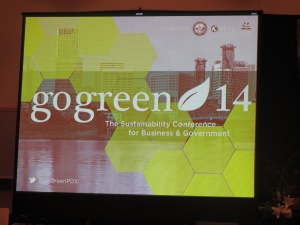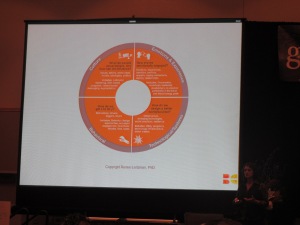 Every day companies are introducing sustainable, socially conscious products and services, engaging in public-private partnerships and working to alleviate social and environmental challenges to fulfill business commitments and goals (financial, environmental and social). Research indicates that more and more consumers aspire to align their purchasing decisions and lifestyle with their values. This is commonly referred to as ‘conscious consumption’. At the same time, employees’ values are showing up more prominently in the workplace. Environmental Leader recently reported that corporate social responsible (CSR) activities have been proven to improve job performance. As employers compete aggressively for talent, they’re learning about the importance of creating compelling experiences that match individuals’ values such as flexibility, shared responsibility and transparency.
Every day companies are introducing sustainable, socially conscious products and services, engaging in public-private partnerships and working to alleviate social and environmental challenges to fulfill business commitments and goals (financial, environmental and social). Research indicates that more and more consumers aspire to align their purchasing decisions and lifestyle with their values. This is commonly referred to as ‘conscious consumption’. At the same time, employees’ values are showing up more prominently in the workplace. Environmental Leader recently reported that corporate social responsible (CSR) activities have been proven to improve job performance. As employers compete aggressively for talent, they’re learning about the importance of creating compelling experiences that match individuals’ values such as flexibility, shared responsibility and transparency.
Last year Sustainable Brands reported on Nielsen’s findings that 50 percent of global consumers are willing to pay more for socially responsible products. Deloitte’s Millennial Survey 2014 indicated that Millennials are disappointed in business and government leaders, and expect improvement in CSR. Sixty-three percent of Millennials donate to charities and 51 percent—more than any other generation surveyed—told Nielsen they would pay extra for sustainable products. As more and more digital natives show more interest in buying socially responsible brands and the number of micro-audiences increase, organizations are facing a more daunting or complex task of engaging and influencing consumers.

At this week’s Go Green Portland conference, Renee Lertzman, Ph.D., author of The Myth of Apathy shared insight about the challenges of engaging and motivating communities of stakeholders in sustainability. She advocated the value and importance of getting smart about the psychological and social dimensions of the stakeholders that we connect with. Assuming that most people share the desire to have impact there is more to consider besides people’s values, beliefs and opinions.
Lertzman explained the complexity of everyday decisions and how people relate to environmental issues. We face dilemmas each day. Think about a person’s decision whether to work from home to reduce their carbon footprint. If a person stays at home they may spend less time emitting carbon on the roads, however the power and energy to warm their home may equal the carbon emissions of a commute. Which option minimizes the impact on the environment? Lertzman argued that people’s capacity to understand issues will directly affect the appropriate engagement strategy to reach these people.
Instead of only focusing on appealing to individuals’ behavioral motivations and triggers, Lertzman pointed to the value of focusing on the emotional and experiential dimension of engagement.
- Meet people where they are: Capitalizing on the energy that exists, mobilizing people to co-create and discuss solutions can help audiences rationalize their situation and negotiate dilemmas and conflicts.
- Show compassion: Knowing that every human being has a fundamental need to have an impact, yet deals with anxiety in decision making, positive reinforcement and compassion breeds understanding and lends itself to promising outcomes.
- Listen: Listening and being inquisitive helps us from jumping too quickly to conclusions and making assumptions. If people aren’t engaging its often because they are overwhelmed. Its often nothing to do with the fact that they don’t care or aren’t motivated. Listening to people, understanding their circumstances can be more effective in driving change, as opposed to pressuring individuals.
You must be logged in to post a comment.